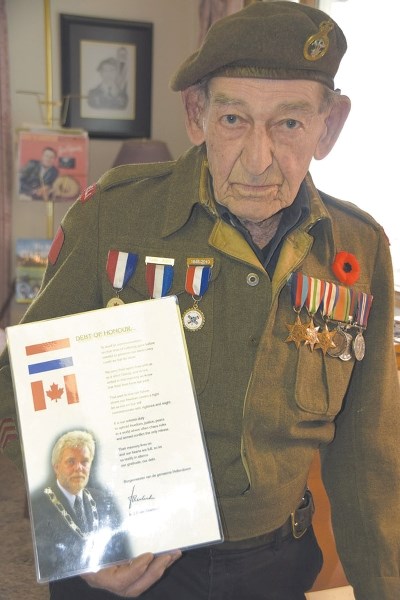From the vast open prairies of Western Canada to the grit of infantry, the heat in Africa, harsh battles and back, Airdrie veteran Arthur Grenier recalls his time serving in the Second World War.
The 93-year-old Second World War veteran has seen the world, fought for Canada and had a personal hand in the surrender of German forces in Holland.
Grenier said one of the highlights of his military career was being present on the day German General Johannes Blaskowitz signed surrender papers, which signified Germany’s surrender in the Netherlands.
After a ceasefire on May 5, 1945, Grenier was tasked with transporting Blaskowitz, blindfolded, to the Hotel de Wereld. It was there that Blaskowitz signed the surrender of German forces in the Netherlands under the eye of the Canadian Corps commander General Charles Foulkes.
“That was the best day of my army career,” said Grenier.
“It never dawned on me (at the time) how important it was that I was chosen to drive that jeep to drive them back.”
A day later he was told to get on a train and head back to Ostend, Belgium, after which he made his way to England and stood on Waterloo Bridge in London when the war was declared over.
Keeping the enemy in Europe was crucial to young North American troops, according to Grenier. He added 1942 was a crucial year during the war.
“That was just about the time that they had reached the shores of Holland, France and Belgium. The enemy got through and they were headed for England,” he said.
“He (Hitler) had overrun so much of Europe. We decided if they’ve got their eye on the North American continent we’re in big trouble.”
Grenier joined the army at the age of 20. He took his basic training at the former Currie barracks in Calgary. He finished his final six months of training in England.
“I wanted to be a driver-mechanic in the war,” said Grenier, but when he arrived in England he was assigned to the infantry to engage the enemy on foot in face-to face combat.
Grenier was involved in battles in Italy, Sicily, and Africa. In England the Germans were dropping flying bombs on Allied soldiers, Grenier was camped at Aldershot about 35 miles outside of London.
In July 1943, Grenier and the First Division of the Canadian Army were sent to Scotland where they were outfitted with warm climate clothing. At the time uniforms were made of wool.
“They were pretty hot especially in a hot climate. We boarded ship. We ended up in North Africa, just outside of Algiers,” said Grenier.
“The war was pretty well over in Africa then that was when they shipped us over to Sicily,” Grenier said.
The soldiers were guarding an overhead trolley line that was shipping manganese from a mine 40-miles inland.
“We waited there until Sept. 3 and we regrouped with all of the Allied armies on Sept. 3 we went across the Messina straights,” said Grenier.
His group lost all of their transport.
“There was a ship in front of us, and a ship behind us that the Germans got with torpedoes,” he said.
The troops had to travel on foot. They stayed over Christmas in Italy, their first objective was a northern town called Ortona, where The Battle of Ortona took place.
Grenier left the Mediterranean region in Feb. 1945.
The Second World War ended in May 1945. Approximately 46,998 Canadian soldiers were killed during the conflict.
This Remembrance Day Grenier will be attending Royal Canadian Legion services at Genesis Place Recreation Centre.
“As we get older, we want to tell more of our experiences to the world,” he said, adding this month he has spoken to children at Airdrie schools about his experiences.
“The younger generation doesn’t know too much about wars,” he said.
Grenier said he hopes to one day return to the Mediterranean on a pilgrimage to pay his respects to friends who died during the Battle of Ortona.



